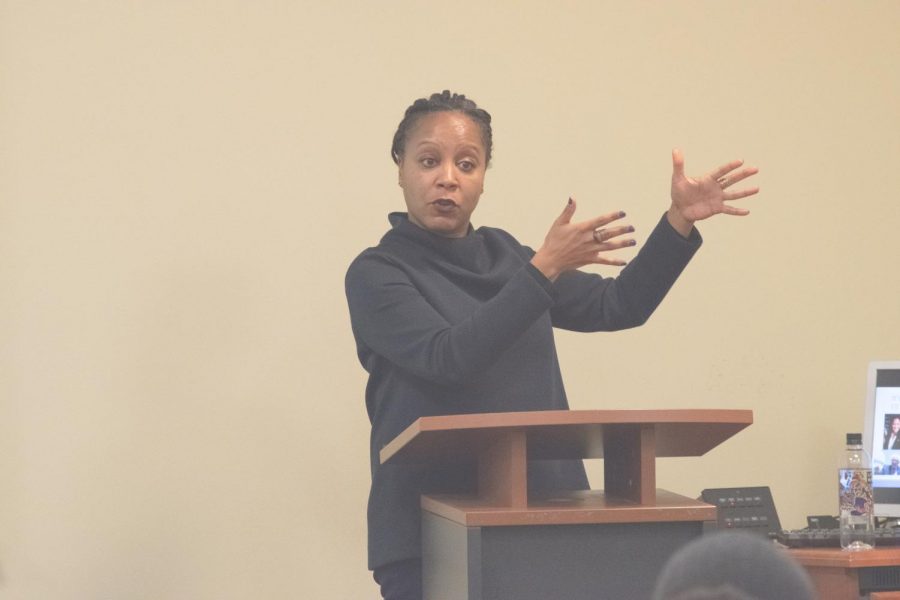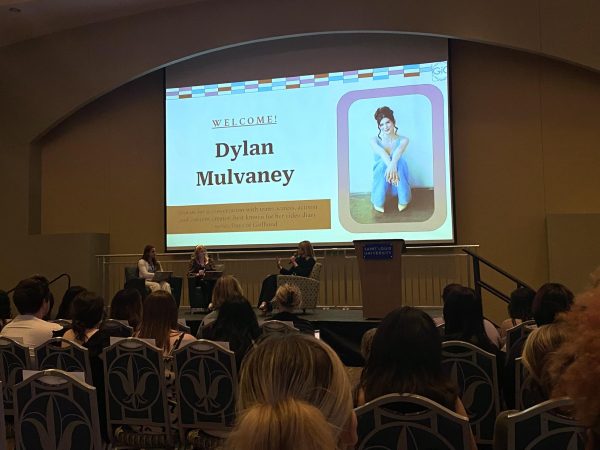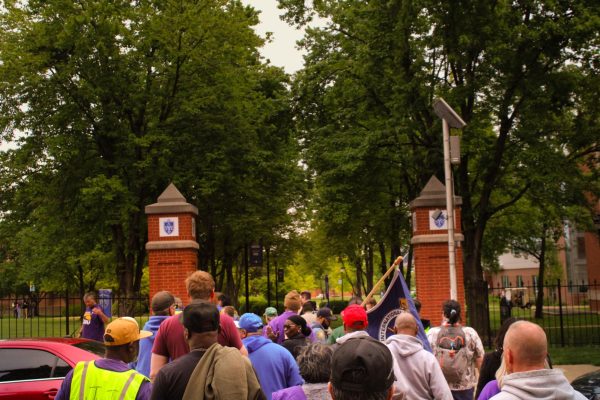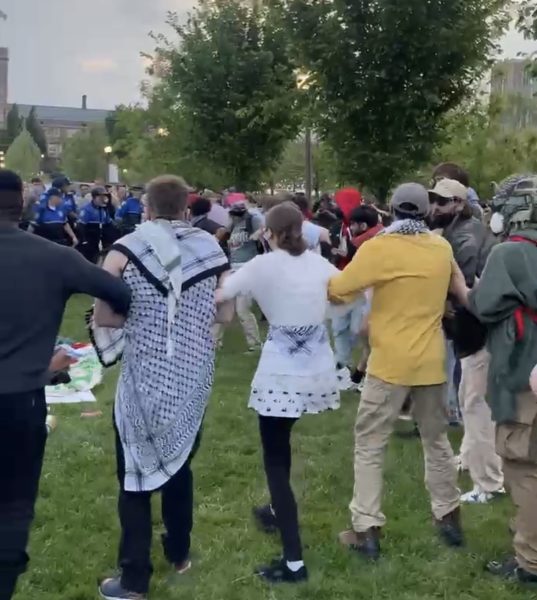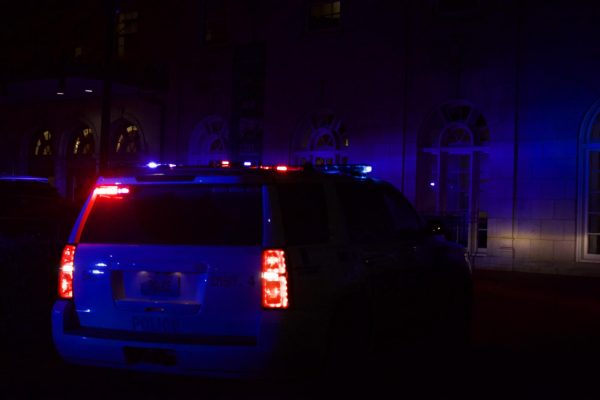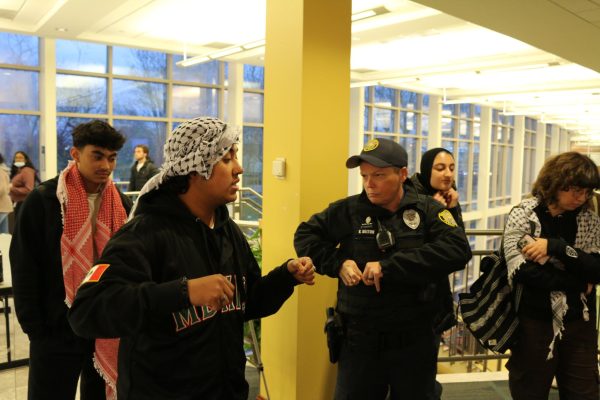Academic and Political Pundit Christina Greer Delivers Black History Keynote Lecture
Christina Greer, P.h.D., Associate Professor of Political Science at Fordham University, gave a lecture titled “Challenges to Democracy: Activism, Education and the 2020 Elections” to a crowd of about forty SLU students, faculty and members of the community in the Busch Student Center Wednesday, Feb. 19 as the keynote lecture of SLU’s “Black Future Month.”
Greer’s research has focused on politics, from the local to the national level, specifically on topics related to African Americans and urban communities. She is currently researching and writing a history of all African Americans who have run for electoral office in the United States.
Her lecture was divided into a few sections. She began with a slideshow of photos of Shirley Chisholm, a Democratic representative of New York, and Charlene Mitchell, who ran for president in 1968 under the Communist Party, two of the first black women to run for national political office in the U.S.
Greer used these figures to lead into discussing problems of intersectionality in the history of women’s and minorities’ civil rights, as well as between how alternative political parties are often ignored by history, even while their ideas are absorbed. She stated, “Just because someone didn’t win doesn’t mean that they should be erased from history.”
Following her discussion of the legacy and imperilment of the Civil Rights Act of 1964 and Voting Rights Act of 1965, Greer talked about the difference between descriptive and substantive politics and its relation to the current Democratic Party primaries. She defined descriptive as voting for candidates based on demographics and substantive as voting based on shared beliefs or policy aims, arguing that it is significantly more difficult for black voters and particularly black women to have both aspirations met in the same candidate.
Finally, Greer discussed some of the primary issues threatening American democracy. She argued that “extreme voter disenfranchisement,” saying the 1965 Voting Rights Act has been “gutted” recently, and declining separation of powers at the federal level were two of the greatest threats, but she also expressed optimism at grassroots organizing, increased voter turnout and the growing number of minority candidates.
One recommendation Greer had not only for political activists but every citizen was “Political Tithing.” Much like religious persons will donate a share of their income to their congregation, Greer posits that politics at various levels of government may come to better represent voters if every person donated five or 10 dollars to candidates and institutions with whom they agree. Greer elaborated, “If we don’t contribute to it [democracy], it will die…. [Tithing] helps candidates feel invested and you feel invested in the cause.”
Throughout her lecture, Greer engaged the audience with “pop quizzes” about various candidates and election results. A healthy and lengthy Q&A section followed in which questions were fielded about differences in media portrayal of Democratic candidates for president, election predictions, defining electability and challenges the black community can face in selecting candidates.
Christopher Tinson, P.h.D., who is the Director of the African American Studies Program and introduced Greer and commented in anticipation of her lecture, “She is one of the best thinkers on the political fortunes of these communities and their efforts to examine, expand, the practice of democracy on local, state, and national levels.”
SLU students and faculty also responded to the University News about Greer’s lecture. Zen, a senior, commented, “I thought Dr. Greer was a great speaker because her speech was relevant to what is happening today, especially with the debate’s tonight.”
Senior Dasia stated, “I don’t know much about politics, so I enjoy[ed] just learning and getting different insight on things.”
Gabe, a senior responded, “I think Dr. Greer did a really great job discussing one of the most charged issues that we face, particularly race, in the country now in 2020 where it’s so clear that our racial divisions are still really present…There are so many threats to the continuation of our democratic process, but at the same time, if we are able to participate in the democratic process, then we can, in some ways, mitigate the damage.”
Greer’s lecture is part of a series of events at SLU celebrating Black history, sponsored by the Office of Diversity and Community Engagement, the African American Studies Program, the Black Student Alliance, and the Cross Cultural Center.
For those who enjoyed Greer’s lecture and want to attend similar events focused on Black history, Tinson stated, “We have at least two other events this is connected to this event. On Tuesday evening, there’s a faculty panel exploring the future of black studies, and on March 17th the annual Bridge Lecture will feature Ashley Farmer, a scholar of black women’s history.”
Your donation will support the student journalists of Saint Louis University. Your contribution will help us cover our annual website hosting costs.


